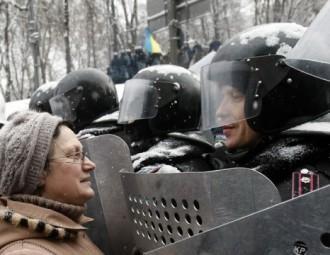Ukrainian opposition cut off talks with Yanukovich under Maidan’s will

Thousands of Maidan participants voted to break negotiations with the authorities and expand the territory of Maidan.
Ukrainian President Viktor Yanukovich says the government will be reshuffled at a special parliamentary session scheduled for January 28 as opposition protesters continued seizing city halls in several towns and cities in western Ukraine, RFE/RL reports.
Yanukovich also said at a meeting with religious leaders that the parliament session will grant amnesty to jailed activists who had not committed serious crimes and will amend restrictive antiprotest laws that came into effect on January 22.
The opposition has called for the laws to be completely revoked.
Anti-government protesters had expanded their protest camp in Kyiv on January 24 after long but inconclusive talks between the opposition and Yanukovich on January 23.
Activists also erected new barricades as thousands of protesters dug in on Independence Square (called Euromaidan by protesters) and also near European Square, on Hrushevskyy Street, just a few hundred meters away from Euromaidan.
Huge fires and billowing smoke can be seen on Euromaidan as large numbers of tires are burning. Riot police have encircled the protesters.
Protesters also occupied the Agriculture Ministry building.
Opposition leader Vitali Klitschko said that mediation by the European Union and Organization for Security and Cooperation in Europe was needed to bring a resolution of the crisis in Ukraine.
EU Enlargement Commissioner Stefan Füle arrived in Kyiv on January 24 where he met with Yanukovich and Andriy Klyuyev, who he appointed as his new chief of staff. Füle is also expected to meet with opposition leaders on January 24.
Opposition leaders held four hours of talks with Yanukovich on January 23, but protesters later dismissed vague concessions offered by the president.
-
03.01
-
07.10
-
22.09
-
17.08
-
12.08
-
30.09










































